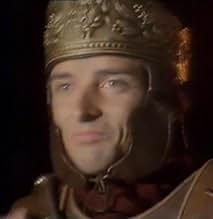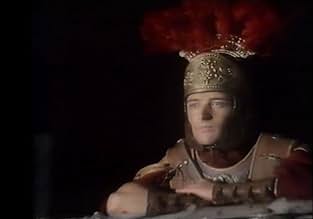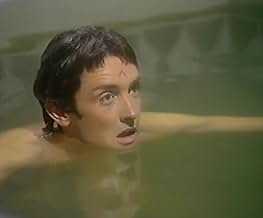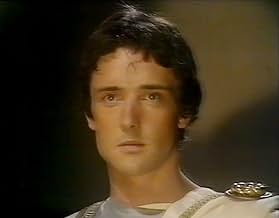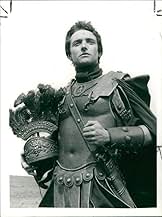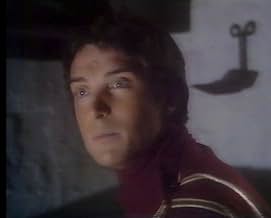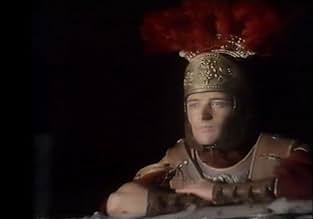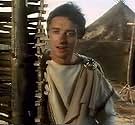In Britannia in 130, a young Roman officer named Marcus Flavius Aquila and his freed slave Esca search for the Ninth Legion's gold eagle standard, which vanished with the legion 13 years ear... Read allIn Britannia in 130, a young Roman officer named Marcus Flavius Aquila and his freed slave Esca search for the Ninth Legion's gold eagle standard, which vanished with the legion 13 years earlier.In Britannia in 130, a young Roman officer named Marcus Flavius Aquila and his freed slave Esca search for the Ninth Legion's gold eagle standard, which vanished with the legion 13 years earlier.
Browse episodes
Featured reviews
I would have been 9 when this was shown and most definitely something I would have watched - however I cant for the life of me recall it!
Being a BBC Scotland production, I wonder, as living in east anglia, if this wasn't shown in my area?
Yes, this production must certainly have been networked by the BBC on the original transmission date as I welll remember watching it back in 1977 (and was living in the west of England at that time). Very well done in all respects - though perhaps the relationship between Roman officers and soldiers (even in an Auxiliary cohort) was portrayed as a little too familiar. This would not have been the case at the time. Roman society was deeply differentiated by class and social status and this would have been even more marked in a military context.
I read the novel as a child back in the 1950s (I have always been a great admirer of Rosemary Sutcliff's novels) and well remember the superb 1957 BBC radio serialisation (now lost) of the book by Felix Felton, broadcast on Children's Hour.
Just as a point of interest, we now know (from archaeological excavations) that Isca Dumnoniorum (Modern Exeter) was originally founded as the base of Legio II Augusta (49-73 CE) and that by the second century (when this story is set) had been abandoned by the Roman army and become a civilian settlement) the new Cantonal capital of the Domnonian tribe.
No matter, this and some other historical anomalies do not detract in the sightest from the story. I am also pleased that the serial has now been released on DVD and may be enjoyed by a new generation of viewers.
I read the novel as a child back in the 1950s (I have always been a great admirer of Rosemary Sutcliff's novels) and well remember the superb 1957 BBC radio serialisation (now lost) of the book by Felix Felton, broadcast on Children's Hour.
Just as a point of interest, we now know (from archaeological excavations) that Isca Dumnoniorum (Modern Exeter) was originally founded as the base of Legio II Augusta (49-73 CE) and that by the second century (when this story is set) had been abandoned by the Roman army and become a civilian settlement) the new Cantonal capital of the Domnonian tribe.
No matter, this and some other historical anomalies do not detract in the sightest from the story. I am also pleased that the serial has now been released on DVD and may be enjoyed by a new generation of viewers.
Loved the book when i first read it as a child in the 70's and thankfully didn't have to wait long to see the series shown in Australia. Rosemary is still one of my favorite authors and i love everyone in this series. Marcus and Esca are great and i even named my dog after Esca-and she was a girl. Best version. Glad i now have it on DVD.
This was made back in the day when the BBC would produce a Sunday evening serialisation of a well known story. This time it's Rosemary Sutcliff's tale of the search by "Aquila" (Anthony Higgins) and his recently spared slave "Esca" (Christian Rodska) for the lost eagle of the ninth Roman legion. His father was one of it's, now rather disgraced, commanders and when "Aquila" hears rumour that this valuable golden symbol has been spotted amongst the tribes in the north of Britain - far beyond the safety of Hadrian's Wall, he decides that, injured as he is, he must restore his family honour and undergo the perilous search to retrieve it. "Esca" was once a tribal prince and sworn enemy of the invaders, but takes a vow of honour to help his new master and off they go on their hazardous quest. With thousands of unwelcoming Scottish glens before them, and the winter weather closing in, they have a big enough challenge on their hands to find the eagle let alone managing to fetch it back safely. Though some of the production is a bit stage bound, and shot using fixed camera positions a lot of the time, the characterisations are well delivered by the not immediately convincing Higgins, the warrior-like Rodska and by David Hayman and Victor Carin as their dangerous adventure hots up. It's fairly faithful to the original story and reminded me that having the net in a gladiatorial battle was not as hopeless as it might seem. It's a good watch.
Chances are that conversion from novel to screenplay will bring a tragic loss of thoughts from the narrator and major characters. However, BBC Scotland's 1977 six-episode television version of Rosemary Sutcliff's 1954 novel manages to keep a delicate balance between a thoughtful story about the meaning of being humane while entertaining us cinematically in 117 A.D. Roman Britannia. Only the 1976 British TV series of Robert Graves' novel, I Claudius, is as engrossing.
The 2011 film, The Eagle, another version of the Sutcliff novel, eliminated the love story and the hero's fondness for his dog (or wolf), "Cub." In doing so, the 2011 version destroyed the novel's charm that should have carried over. However, the 1977 series transitions Sutcliff's writing perfectly. The production design, costumes, music and acting are also spot on. The detail for props is outstanding, e.g. a sophisticated Roman scissors hangs on a wall behind Marcus in Episode One.
The ensemble of actors includes fine performances from a young Patrick Malahide as Cradoc, the rebellious Caledonian, and Gillian Bailey as Cottia, the love interest of the hero, Marcus.
Anthony Higgins' performance in the lead role pleased novelist Sutcliff so much that she kept a framed photo of the actor in costume on her desk, it is said, until the day she died, as he brought Marcus to life just as she had hoped he would. Higgins is at the top of his game in this role. He's young, confident and strong; he carries the entire program on his shoulders.
The character's determination to exert his passion for life, while comporting himself as a noble Roman officer should, is fascinating. His ambition to recover The Eagle, symbol and standard for the vanished Ninth Legion, (of which his father was one), is limitless.
Higgins told a story about the power of the 1977 version of Eagle of the Ninth at Comic Con in Munich in April 2017. He said, "A couple of years ago, I was doing a movie in Malta about the life of Napoleon. We had an expert historian with us, who knew every button, feather and decoration that anyone of that period would have worn.
"He said to me, 'You know, you're to blame. When I was a kid, I saw Eagle of the Ninth and became obsessed with it. It made me want to learn everything I could about Roman armies, uniforms and weapons. That led me to go to Cambridge to study history. It's all because of you that I ended up there— because you did Eagle of the Ninth.'"
Higgins continued, "With all humility, an actor is just a sign for telling a story. What's amazing is the resonance that can unintentionally result."
Yes, its lasting effect rings true and clear. I'm delighted to have seen this program in its entirety and if you as a viewer come across it, consider yourself very lucky. It's captivating and worthwhile.
The 2011 film, The Eagle, another version of the Sutcliff novel, eliminated the love story and the hero's fondness for his dog (or wolf), "Cub." In doing so, the 2011 version destroyed the novel's charm that should have carried over. However, the 1977 series transitions Sutcliff's writing perfectly. The production design, costumes, music and acting are also spot on. The detail for props is outstanding, e.g. a sophisticated Roman scissors hangs on a wall behind Marcus in Episode One.
The ensemble of actors includes fine performances from a young Patrick Malahide as Cradoc, the rebellious Caledonian, and Gillian Bailey as Cottia, the love interest of the hero, Marcus.
Anthony Higgins' performance in the lead role pleased novelist Sutcliff so much that she kept a framed photo of the actor in costume on her desk, it is said, until the day she died, as he brought Marcus to life just as she had hoped he would. Higgins is at the top of his game in this role. He's young, confident and strong; he carries the entire program on his shoulders.
The character's determination to exert his passion for life, while comporting himself as a noble Roman officer should, is fascinating. His ambition to recover The Eagle, symbol and standard for the vanished Ninth Legion, (of which his father was one), is limitless.
Higgins told a story about the power of the 1977 version of Eagle of the Ninth at Comic Con in Munich in April 2017. He said, "A couple of years ago, I was doing a movie in Malta about the life of Napoleon. We had an expert historian with us, who knew every button, feather and decoration that anyone of that period would have worn.
"He said to me, 'You know, you're to blame. When I was a kid, I saw Eagle of the Ninth and became obsessed with it. It made me want to learn everything I could about Roman armies, uniforms and weapons. That led me to go to Cambridge to study history. It's all because of you that I ended up there— because you did Eagle of the Ninth.'"
Higgins continued, "With all humility, an actor is just a sign for telling a story. What's amazing is the resonance that can unintentionally result."
Yes, its lasting effect rings true and clear. I'm delighted to have seen this program in its entirety and if you as a viewer come across it, consider yourself very lucky. It's captivating and worthwhile.
Did you know
- TriviaThe series takes place from 129 to 131.
- ConnectionsVersion of L'Aigle de la Neuvième Légion (2011)
- How many seasons does The Eagle of the Ninth have?Powered by Alexa
Details
- Release date
- Country of origin
- Language
- Also known as
- El águila de la novena
- Production company
- See more company credits at IMDbPro
Contribute to this page
Suggest an edit or add missing content

Top Gap
By what name was The Eagle of the Ninth (1977) officially released in Canada in English?
Answer
